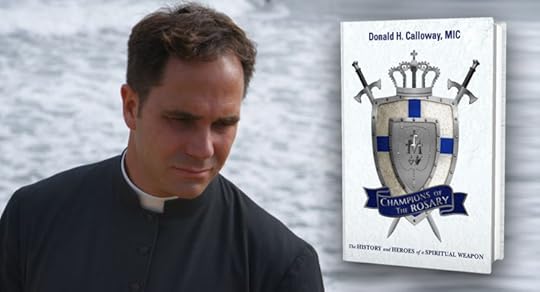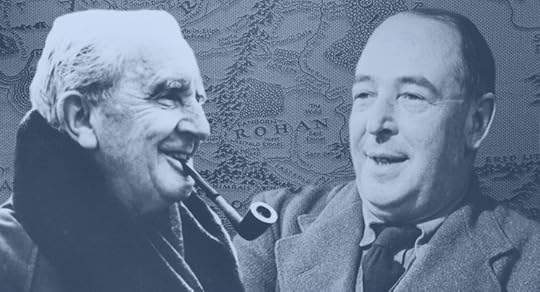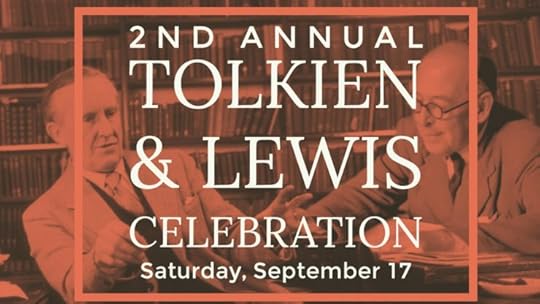Brandon Vogt's Blog, page 7
September 8, 2016
Champions of the Rosary: An Interview with Fr. Donald Calloway
Fr. Donald Calloway has one of the most amazing conversion stories I’ve ever come across. He was a modern day Augustine, wrapped up in all the wrong things (and even getting DEPORTED from Japan because things got so bad!) But then through a few providential encounters, which you’ll learn about below, he not only came to know God but discerned his calling to be a priest.
The rosary played a key role in his conversion, and ever since Fr. Calloway has become one of its greatest advocates. He just published a fantastic new book, titled Champions of the Rosary: The History and Heroes of a Spiritual Weapon, which looks at several saints who depended on this devotion. It’s masterfully written and very comprehensive. After just a few pages you’ll be inspired to pick up your beads and wield this powerful spiritual weapon.
Today, I sit down with Fr. Calloway to discuss his new book, the power of the rosary, and special tips for praying the rosary even if you struggle with it. Enjoy!
(NOTE: Fr. Calloway’s book keeps going out of stock because it’s selling like crazy, but if you’re lucky enough to find it in stock, you can order your copy here.)
BRANDON VOGT: I love your new book, Champions of the Rosary: The History and Heroes of a Spiritual Weapon. At a hefty 420+ pages, I think it’s now THE definitive book on the rosary. But there are lots of rosary books available. Why this one?
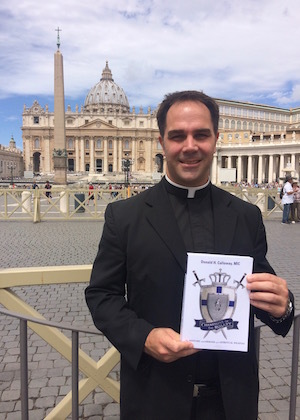 FR. DONALD CALLOWAY: Yes, there are a lot of books on the rosary that have been written. Many of these books are very good and help a person pray their rosary with a particular intention in mind, for example, inner healing, for the souls in purgatory, etc.
FR. DONALD CALLOWAY: Yes, there are a lot of books on the rosary that have been written. Many of these books are very good and help a person pray their rosary with a particular intention in mind, for example, inner healing, for the souls in purgatory, etc.
However, after St. Louis de Montfort wrote The Secret of the Rosary in the early 18th century there has not been a book written that has offered a comprehensive look at the rosary that covers all of the miracles, battles, victories, developments, papal pronouncements, and heroes who have championed the rosary since the 18th century.
With libraries around the world at our fingertips today, all of these hidden historical treasures and insights need to be added to the story of the rosary.
BRANDON: The rosary and Our Lady both played a pivotal role in your conversion. For the whole story, readers should check out your memoir, No Turning Back: A Witness to Mercy. But can you give us a summary of the roles they played?
FR. CALLOWAY: I often tell people that God drew me to himself by baiting me with the beauty and loveliness of the Blessed Virgin Mary. As a young man, I was radically in pursuit of beauty but, as the saying goes, I was looking in all the wrong places. Things were so bad in my life that I dropped out of high school, went to two rehabilitation centers, was deported from the country of Japan for criminal activity (my step-father was a Naval officer at the time), and thrown in jail when I turned eighteen. Needless to say, I wasn’t a Church-goer; I didn’t even believe in God.
Yet, one night when I hit my ultimate rock bottom, I picked up a book that my recently converted parents had purchased and put on their bookshelf. It was about a woman named the Virgin Mary and alleged appearances that were happening to a group of small children. I was completely fascinated by the book and I read it in one night!
After reading that book, I went to a Catholic priest the very next day. The priest I talked to was incredible and it was an encounter that forever change my life and, ultimately, led me to become a Catholic.
During that same visit, I witnessed a group of Filipino women praying the rosary. At the time, I had no idea what they were doing but it only took me a week to join in with them and become a daily participant in their communal rosary before Mass. I attribute the daily prayer of the rosary to my discernment of my vocation to the priesthood. From the initial days of my conversion until now, I continue to pray the rosary every single day, and always have a rosary in my pocket. I’ve been a Catholic for twenty-three years now and a priest for over thirteen years.
BRANDON: In the book, you describe the rosary as “the sword of Our Lady.” How can this simple set of beads be a true spiritual weapon?
FR. CALLOWAY: Understanding the rosary as a spiritual weapon is vital to understanding why it is so powerful and the reasons for why heaven gave it to us. The rosary came into existence in the year 1208, when Our Lady appeared to St. Dominic and instructed him to use it as a weapon against falsehoods. The 13th century was a time of knights, battles, swords, and chivalry. By using a set of prayer beads containing the sacred mysteries of Jesus as the foundation of his preaching, St. Dominic wielded it as a spiritual sword against falsehoods and theological errors. I love the fact that during his lifetime Catholics wore the rosary on the left side of their belt to signify the side from which a knight withdrew his sword from its sheath.
While it is true that a set of prayer beads doesn’t look like a weapon, what gives the rosary its power is what can’t be seen with the human eye. What God and the angels (both holy and fallen) see that we can’t is that the rosary encapsulates and enshrines the saving mysteries of the God-Man. It is those mysteries that set us free from the bondage of Satan. This is why Satan hates the rosary and fears it so much. The rosary is a dragon slayer!
BRANDON: Per the book’s title, let’s talk about some of the champions of the rosary. Most of us know saints who loved the rosary, including St. Louis de Montfort, St. Therese, and St. John Paul II. But you cover 26 specific champions in your book. Who are some lesser known ones we should get to know?
FR. CALLOWAY: I would love to tell you about each one of the 26 champions, but I’ll give you a sampling and briefly mentioning four of them. For example, one champion that not too many people know about is Saint Anthony Mary Claret, the founder of the Claretians. During his life, he received several visions of the Virgin Mary in which she instructed him that he was to be the “new St. Dominic” of his time in his promotion of the rosary. As the archbishop of Santiago, Cuba, St. Anthony mandated that all his priests pray the rosary with the people on Sundays and Solemnities. To make sure this practice was being done, St. Anthony would make surprise visits to the parishes of his diocese and watch from the back pew!
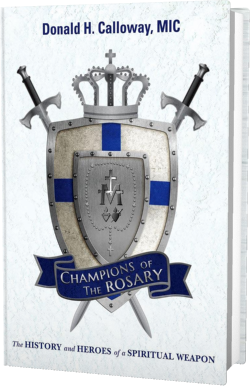 Then there is Pope Leo XIII. He is the pope who promoted the rosary more than any other pope in Church history. During his pontificate, he wrote eleven encyclicals on the rosary, as well as numerous apostolic letters and exhortations. He gave us the famous Prayer to St. Michael and added the title “Our Lady of the Rosary” to the Litany of Loreto.
Then there is Pope Leo XIII. He is the pope who promoted the rosary more than any other pope in Church history. During his pontificate, he wrote eleven encyclicals on the rosary, as well as numerous apostolic letters and exhortations. He gave us the famous Prayer to St. Michael and added the title “Our Lady of the Rosary” to the Litany of Loreto.
Another one of my favorite champions is Blessed Bartolo Longo. He was a layman who was once an ordained Satanic priest! As a college student he had abandoned the Catholicism of his youth and started attending séances. This eventually led him to being ordained in an evil cult. After having suffered from nightmares, hallucinations, depression, anxiety, and even suicidal thoughts, he talked to a Dominican priest and had a profound conversion. The Dominican priest told him about the power of the rosary, which led Bartolo to renounce the occult, become a Third Order Dominican, and initiate the construction of the world’s most famous Shrine dedicated to the rosary: The Pontifical Basilica of Our Lady of the Rosary of Pompeii, Italy. He was beatified in 1980 by St. John Paul II.
Then there’s Blessed James Alberione. He was the founder of ten religious institutes, including the Daughters of St. Paul, and rarely gave a talk without having first prayed a rosary beforehand. Whenever he traveled anywhere, he would always invite those around him to pray the rosary and he would pray it continuously until he reached his destination!
This is but a snippet of the many interesting facts about some of the greatest champions of the rosary in the church. I wish I could give a detailed account of every champion of the rosary here, but I’ll leave that as an incentive for people to get the book. In the book, I offer in-depth presentations on the 26 greatest champions, as well as presenting over 200 other individuals who greatly championed the rosary.
BRANDON: What advice would you give someone who has tried praying the rosary, but just finds it dull or engaging?
FR. CALLOWAY: I would remind them that even saints struggled with praying the rosary. Yet, it is important to remember that those who love Jesus and Mary never give up! Even though some saints struggled with praying the rosary, none of them ever gave up. For example, St. Thérèse of Lisieux often mentioned how difficult it was for her to pray the rosary and meditate on the mysteries, but she also noted that she gave it her best effort and knew that since Mary was her spiritual mother Our Lady knew Thérèse’s heart and accepted whatever she gave her.
Personally, I think everyone gets distracted and experiences their mind wandering during the rosary. We are not angels or robots, and do not have the ability to ponder one thing for long periods of time without other thoughts coming to our mind. No one should panic over this or give up praying the rosary because of it. To help with this, we have the blessing today of having beautiful little pamphlets that have images for each mystery on them. Many people have found that if they gaze upon a visual image of each mystery they get less distracted and are able to meditate easier.
BRANDON: As a father of young kids, I’m asked all the time how to instill a deeper prayer life at home. I’m assuming you’d recommend families pray the rosary together. But what are some tips or strategies to make it fruitful, especially for families with small children?
FR. CALLOWAY: The family rosary is very powerful and there have been many popes and saints who have promoted it. However, popes and saints also know that young children can become rambunctious during a twenty-minute prayer commitment. This is why many holy people have recommended that a good method to follow when young children are involved is to pray a decade as a family every evening, but save the praying the entire rosary (one set of mysteries) for Sundays and Holy Days of Obligation.
I would also suggest that in order to instill in young children an understanding of what they are doing when they pray the rosary, it can help to describe each mystery to them and then have them draw the mystery and color it in with crayons. This is a creative way of helping young children understand the rosary in a deeper and more childlike way.
For those interested in obtaining a copy of Fr. Calloway’s new book Champions of the Rosary: The History and Heroes of a Spiritual Weapon, it can be purchased on Fr. Calloway’s website, FatherCalloway.com, or via Amazon.com.

The post Champions of the Rosary: An Interview with Fr. Donald Calloway appeared first on Brandon Vogt.





September 6, 2016
St. Teresa of Calcutta on the 2 Words Jesus Wants You to Hear
This past weekend, we celebrated the canonization of our newest saint, St. Teresa of Calcutta! As the whole world buzzes with admiration for this holy nun, I thought I’d share a marvelous letter that she wrote during Eucharistic adoration, which includes the two words Jesus wants all of us to hear.
(NOTE: If you haven’t already, be sure to download my latest FREE book, titled St. Teresa of Calcutta: The Secret of Her Holiness. It’s a short PDF eBook that reveals several stories and lessons about Mother Teresa.. Download it right now at TeresaCalcuttaBook.com. Enjoy!)
Download PDF eBook Here
Jesus wants me to tell you again how much love He has for each one of you beyond all you can imagine. I worry some of you still have not really met Jesus—one to one—you and Jesus alone.
We may spend time in chapel—but have you seen with the eyes of your soul how He looks at you with love? Do you really know the living Jesus—not from books but from being with Him in your heart? Have you heard the loving words He speaks to you?
Ask for the grace; He is longing to give it. Until you can hear Jesus in the silence of your own heart, you will not be able to hear Him saying “I thirst” in the hearts of the poor. Never give up this daily intimate contact with Jesus as the real living person—not just the idea. How can we last even one day without hearing Jesus say “I love you”—impossible. Our soul needs that as much as the body needs to breathe the air. If not, prayer is dead—meditation, only thinking. Jesus wants you each to hear Him—speaking in the silence of your heart.
Be careful of all that can block that personal contact with the living Jesus. The Devil may try to use the hurts of life, and sometimes our own mistakes—to make you feel it is impossible that Jesus really loves you, is really cleaving to you. This is a danger for all of us. And so sad, because it is completely opposite of what Jesus is really wanting, waiting to tell you. Not only that He loves you, but even more—He longs for you. He misses you when you don’t come close. He thirsts for you. He loves you always, even when you don’t feel worthy. When not accepted by others, even by yourself sometimes—He is the one who always accepts you.
My children, you don’t have to be different for Jesus to love you. Only believe—you are precious to Him. Bring all you are suffering to His feet only open your heart to be loved by Him as you are. He will do the rest.
You all know in your mind that Jesus loves you—but in this letter Mother wants to touch your heart instead. Jesus wants to stir up our hearts, so not to lose our early love. That is why I ask you to read this letter before the Blessed Sacrament, the same place it was written, so Jesus Himself can speak to you each one.
Jesus Himself must be the one to say to you, “I thirst.” Hear your own name. Not just once. Every day. If you listen with your heart, you will hear, you will understand.
“I thirst” is something much deeper than Jesus just saying “I love you.” Until you know deep inside that Jesus thirsts for you—you can’t begin to know who He wants to be for you. Or who He wants you to be for him.
SOURCE: The Poor Clares of Perpetual Adoration, Manual for Eucharistic Adoration (Charlotte, NC: TAN Books, 2016), 129.
The post St. Teresa of Calcutta on the 2 Words Jesus Wants You to Hear appeared first on Brandon Vogt.





August 25, 2016
Learning from a Wise and Just Ruler

Today we continue our regular series called “Learning from the Saints.” Our guide is expert Bert Ghezzi, a dear friend of mine and the author of numerous books including Voices of the Saints, Saints at Heart, and Discover Christ: Developing a Personal Relationship with Jesus.
His more recent books are The Power of Daily Mass and The Heart of Catholicism. You can learn more about Bert and his work at BertGhezzi.com.
Today, Bert profiles St. Louis IX, the patron of the death of children, difficult marriages, parents of large families, prisoners, and sickness.
Had history not left us an accurate record of King Louis IX’s reign, we might be tempted to regard his story as religious fiction. Imagine a king who put God first, who would rather die a leper than commit one mortal sin, who prayed the divine office daily, who often personally waited table for his poor guests, and who waged war only to build peace—and you would have a snapshot of Saint Louis IX.
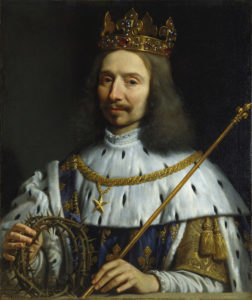 During his long reign in France from 1235 to 1270, Louis IX presided over a religious and cultural renaissance. For example, he established three monasteries, supported the foundation of the Sorbonne, and sponsored the construction of great Gothic cathedrals. Twice Louis went to war against Henry III of England, but instead of pressing for total victory, he negotiated a settlement that he believed would guarantee peace.
During his long reign in France from 1235 to 1270, Louis IX presided over a religious and cultural renaissance. For example, he established three monasteries, supported the foundation of the Sorbonne, and sponsored the construction of great Gothic cathedrals. Twice Louis went to war against Henry III of England, but instead of pressing for total victory, he negotiated a settlement that he believed would guarantee peace.
If we could ask John of Joinville, his biographer, to name the king’s defining trait, I think he would say “just judgment.” In the following selection, for example, Joinville describes the king’s practice of personally settling his subject’s cases:
“Often in the summer he went after mass to the wood of Vincennes and sat down with his back against an oak tree, and made us sit all around him. Everyone who had an affair to settle could come and speak to him without the interference of any official. The king would ask, ‘Is there anyone here who has a case to settle?’ All those who had would then stand up and he would say, ‘Quiet, all of you, and your cases will be dealt with in turn.’
“Then he would call my Lord Peter of Fontaines and my Lord Geoffrey of Villette and say to one of them, ‘Now give me your judgment in this case.’
“When those who spoke for him or for the other part said anything which he saw needed correction, he corrected it himself.”
In 1234, Louis IX married Margaret of Provence, to the great displeasure of his mother, Blanche of Castile. She detested the young queen and did all she could to make the couple miserable. For many years, for example, she forced them to live in separate apartments, one situated above her own rooms and another below. But that did not seem to stop their meeting, as Margaret bore Louis IX eleven children. Relief came only when Blanche died in 1254.
Louis IX lead two disastrous crusades against the Muslim invaders of Palestine, but we must not be too quick or too harsh in judging him. His sole motive seems to have been bringing aid to Christians who were suffering under their Saracen conquerors. And he tried, though unsuccessfully, to restrain the violence of the crusading army. On the second expedition, Louis IX caught typhoid fever at Tunis and died on August 24, 1270.
Louis IX had an easier time ruling an entire kingdom with justice than the mayor of a city like Miami has governing today. Things moved more slowly in the thirteenth century, fewer people were alive, and events were somewhat more manageable. But even though everything is bigger now and impossible to control, contemporary governors would do well to imitate the saint-king’s love of God and his justice. The results just might seem too good to be true.
Read more from Bert at his website www.BertGhezzi.com, or check out his many books on Amazon.
The post Learning from a Wise and Just Ruler appeared first on Brandon Vogt.





August 23, 2016
My BIG new project!
Quick question:
What was last Sunday’s Gospel reading?
What was it about?
Can you remember?
Can you even recall which Gospel it was from?
If not, you’re not alone. Most Catholics forget the Gospel even before Mass is over.
Why?
Two reasons:
First, we don’t read the Gospel in advance.
Second, we don’t study the Gospel to see what the great spiritual masters have said about it.
Those are big problems. If we don’t read, remember, or study the Gospel, how can it possible shape our lives?
The simple answer is……
….it can’t.
I want to help fix that. I recently decided to create a simple tool for busy people like you and me, to make it much easier to read and study the Sunday Gospel each week.
It’s called DeeperGospel.
Click here to check it out! → http://DeeperGospel.com
You know I LOVE sending you FREE stuff, and this project is another freebie.
It’s a 100% free email list. Here’s how it works:
When you sign up, you’ll receive one email each Thursday morning which contains two things:
1) The entire Gospel passage for the upcoming Sunday (NAB translation, the same one you’ll hear at Mass)
2) Three short reflections on that passage from different saints, popes, and Church Fathers.
It’s simple, it’s quick, and it will get the Gospel stirring in your mind and heart way before you show up for Sunday Mass.
Sign Up Now! → Send Me the DeeperGospel Weekly Email
Enjoy!
The post My BIG new project! appeared first on Brandon Vogt.





August 17, 2016
Tolkien, Lewis, and the Christian Imagination: An Interview with Joseph Pearce
If you’re a fan of C.S. Lewis or J.R.R. Tolkien, you probably know the name Joseph Pearce. He’s one of the leading experts on the Inklings and has written many books on them, alongside his books on the literary figures who influenced them. He’s written about C.S. Lewis and the Catholic Church, the Christian themes in Tolkien’s Lord of the Rings, and a whole field guide to the Catholic literary landscape.
Next month, Joseph is hosting a one day Tolkien/Lewis conference at Aquinas College in Nashville, where he teaches. If you live anywhere near Nashville, you should definitely come. I’ll be there, Joseph will be there, and so will several other top Tolkien/Lewis scholars such as Michael Ward, Fr. Dwight Longenecker, Kevin O’Brien, and Devin Brown. Find more information here:
Learn More about 2nd Annual Tolkien & Lewis Celebration
Today, I sit down with Joseph to discuss Tolkien, Lewis, and next month’s exciting conference. Enjoy!
BRANDON VOGT: You’ve written several books on J.R.R. Tolkien and C.S. Lewis, including biographies and analyses of their great fantasy stories. What is it about these two writers that has captured so many Christians? Why are they equally beloved among Protestants, Catholics, and Orthodox?
JOSEPH PEARCE: I think that the works of Tolkien and Lewis have captured so many Christians for the same reason that they have captivated millions of non-Christians. The fact is that The Lord of the Rings and The Lion, the Witch, and the Wardrobe are among the bestselling books of all time.
Their secret is, I believe, to be found in the beauty of the storytelling, the depth of the imagination that informs it, and the way that the beauty is infused with the goodness and truth of a solidly Christian worldview.
Non-Christian readers might not notice or acknowledge the Christian infusion, though they imbibe it subconsciously nonetheless, whereas Christian readers are of course very at home in the theologically rich worlds of Middle-earth and Narnia, worlds which harmonize profoundly with the Christian cosmos.
BRANDON: It’s fair to say that Lewis’ Christianity is more explicit in the Chronicles of Narnia than Tolkien’s was in his Lord of the Rings. But in both cases, the writers created (or sub-created, to use Tolkien’s terms) worlds that were deeply imbued with a Christian imagination. What does this mean? What makes these stories “Christian” even though they may not explicitly reference God, the Church, the liturgy, sacraments, etc.?
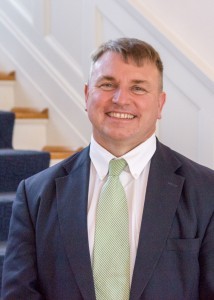 JOSEPH: You are right to differentiate between the more explicit Christianity in Lewis’ Narnia and the far more subtle Christian dimension in The Lord of the Rings. Aslan is quite clearly a thinly-veiled figure of Christ, at all times in all the stories, whereas several characters in The Lord of the Rings exhibit Christ-like traits and tropes without ever being Christ-figures per se.
JOSEPH: You are right to differentiate between the more explicit Christianity in Lewis’ Narnia and the far more subtle Christian dimension in The Lord of the Rings. Aslan is quite clearly a thinly-veiled figure of Christ, at all times in all the stories, whereas several characters in The Lord of the Rings exhibit Christ-like traits and tropes without ever being Christ-figures per se.
Frodo reminds us of Christ in his role as the Ring-bearer, paralleling Christ the Cross-bearer. Aragorn reminds us of Christ in his Kingship and the way that it manifests itself in his power of healing and the power he wields over the dead. Gandalf reminds us of Christ in his death, resurrection, and transfiguration. And even lembas, which means life-bread or bread of life in elvish, reminds us of Christ sacramentally in its applicability as a signifier of the Eucharist.
And yet, unlike Aslan, none of these characters are Christ figures at all times but only at certain times or in certain aspects of their characterization or role within the story. Whereas Lewis’ approach was more formally allegorical, or at least tended in that direction, Tolkien’s was modeled on the more subtle figurative approach used by, for example, the Beowulf poet.
BRANDON: Bishop Robert Barron once suggested that J.R.R. Tolkien was one of the most effective evangelists of the twentieth century since he ably smuggled the Gospel into an unsuspecting culture. What do you think about that? Would you consider Tolkien and Lewis evangelists? Why are stories potent ways to evangelize?
JOSEPH: I would agree with Bishop Barron. Tolkien and Lewis are evangelists in the sense that they are bearers of good news through the telling of good stories. We know that stories are potent ways to evangelize because they have been sanctioned and sanctified by Christ Himself who taught many of his most important lessons in the form of parables. On a deeper lever, Christ also told us the most powerful story in the unfolding of his birth, life, suffering, death, resurrection and ascension.
The Greatest Story ever told is Christ’s own life story. This was what Tolkien and Lewis called the True Myth, the myth that really happened. Other myths or stories, such as the ones told by Tolkien and Lewis themselves, are echoes of that True Story.
This was best summed up, perhaps, by Father History in Lewis’ Pilgrim’s Regress who explains that the ancient pagan myths were pictures sent by God to those who had forgotten how to read. We also live in an age and culture which has forgotten how to read and which refuses to read the Gospel. This being so, we can say that God has sent our own godless generation pictures in the forms of the grace-filled works of Tolkien and Lewis.
BRANDON: It’s not uncommon to hear writers today christened “the modern C.S. Lewis” or “the next Tolkien.” The two Inklings were undoubtedly uniquely gifted, but who are their successors? Who are the writers evangelizing the imagination today?
JOSEPH: Tolkien and Lewis were so wonderfully gifted that it’s difficult to imagine anyone filling their shoes. That being said, I do believe that we are seeing a new Christian cultural revival.
As the editor of the St. Austin Review, a journal of Catholic culture, I am very aware of the many Christian novelists, short story writers, poets, artists, architects and musicians working in today’s culture. These have increased dramatically in terms of quality and quantity in the fifteen years since the St. Austin Review was launched. One thinks especially of novelists, such as Tim Powers, Michael D. O’Brien, Lucy Beckett, Arthur Powers and Dena Hunt, to name but a few.
It was a desire to help nurture and nourish this new literary revival that inspired me and my colleagues at the Center for Faith & Culture at Aquinas College in Nashville to establish the Aquinas Award for Fiction, the second recipient of which is the aforementioned Michael D. O’Brien for his novel, Elijah in Jerusalem.
BRANDON: You teach now at Aquinas College in Nashville, and you’ve helped to arrange an exciting one-day conference on that campus on Saturday, September 17, 2016. It’s called the 2nd Annual Tolkien & Lewis Celebration and it looks amazing. I signed up right when I heard about it, so I’ll definitely be there. You’ll be there, too. You’re speaking alongside Michael Ward, Fr. Dwight Longenecker, Kevin O’Brien, Devin Brown, and lots of other Tolkien and Lewis experts. Tell us more about that conference. Why should people attend?
JOSEPH: When I became Director of the Center for Faith and Culture at Aquinas College, I wanted to have an annual Shakespeare Celebration on the nearest weekend to the Bard’s birthday (April 23) and an annual Tolkien and Lewis Celebration on the nearest weekend to Hobbit Day (September 22). Last year’s Tolkien and Lewis Celebration was hugely successful, with around 250 people in attendance.
This year’s Celebration will include presentations by some of the finest scholars in the world, as well as a dramatic re-enactment by the Theatre of the Word of the famous “night talk” between Tolkien and Lewis in September 1931 which led to Lewis’ conversion to Christianity.
We will also be opening a “Tolkien, Lewis and Friends Exhibit” at the College on the day of the Celebration, featuring rare and unique artifacts associated with Lewis, Tolkien and other members of the Inklings. In short, our Celebration is much more than a mere conference. It is very much a joy-filled and rambunctious celebration of these two great writers and the priceless legacy that they have bestowed upon us.
There’s only one place for any lover of Lewis and Tolkien to be on Saturday, September 17 and that is at Aquinas College in Nashville, Tennessee. More details can be found here:
Learn More about 2nd Annual Tolkien & Lewis Celebration
The post Tolkien, Lewis, and the Christian Imagination: An Interview with Joseph Pearce appeared first on Brandon Vogt.





August 2, 2016
Resisting Happiness: An Interview with Matthew Kelly
A few years ago I discovered Steven Pressfield’s bestselling book, The War of Art: Break Through the Blocks and Win Your Inner Creative Battles. It’s one of the few books that I finished, immediately re-read, and then raved about to anyone who would listen.
Pressfield’s diagnosis of what haunts all writers and artists—he calls it Resistance—is spot on. We all know Resistance. It’s the muggy force that keeps you stuck in life. It prevents you from doing what you long to do. It’s the inner naysayer, the inertia, the roadblock that stops you from finishing new things, whether it’s starting that business, writing that book, or painting that masterpiece. If you’ve ever sat down to work on something and felt distracted, timid, or hopeless, you’ve met Resistance.
But Pressfield offers a way forward. His punchy book is full of strategies to overcome Resistance, and the advice works. In fact, I don’t think I would have written a single book if he hadn’t encouraged me to “just show up,” to park myself in front of a computer and write every day whether I felt inspired or empty.
 But when you read Pressfield, who isn’t a religious believer, it’s hard to not to think, “Ah! You’re so close! You’ve found the enemy, stared him in the eyes, but you’re only seeing one side of him. You’re like Plato in the cave. You’ve conquered the shadows but there’s more to the Enemy than that!” Pressfield may call his malevolent force Resistance, but we Christians know it as a person and by another name: either the Enemy, or the Devil, or to use St. Paul’s language, “the principalities and powers who rule this world of darkness” (Eph 6:12). There are powerful unseen forces in this world that want to keep you stuck, that want to hold you back from sharing your gifts and ultimately finding true happiness.
But when you read Pressfield, who isn’t a religious believer, it’s hard to not to think, “Ah! You’re so close! You’ve found the enemy, stared him in the eyes, but you’re only seeing one side of him. You’re like Plato in the cave. You’ve conquered the shadows but there’s more to the Enemy than that!” Pressfield may call his malevolent force Resistance, but we Christians know it as a person and by another name: either the Enemy, or the Devil, or to use St. Paul’s language, “the principalities and powers who rule this world of darkness” (Eph 6:12). There are powerful unseen forces in this world that want to keep you stuck, that want to hold you back from sharing your gifts and ultimately finding true happiness.
I’ve been wishing for years that a Christian author would baptize Pressfield’s ideas and create a more spiritually discerning version of The War of Art, one that would see Resistance’s full face and then offer the Church’s vast spiritual antidotes against it.
Well, finally someone’s done it—and not just anyone, but one of the most effective Catholic writers of our generation, Matthew Kelly.
Matthew is a New York Times bestselling author and the founder of Dynamic Catholic, an evangelization ministry whose mission is to re-energize the Catholic Church in America. They do this through world-class formation programs and their super popular book program, which has distributed more than 10 million Catholic books to parishes. The books are typically passed out free on Christmas and Easter to engage disengaged Catholics.
Matthew’s newest book, Resisting Happiness (Dynamic Catholic, 2016), has that same goal. Like Pressfield, Matthew reveals the main foe standing between us and happiness. We know the things that make us happy, but we don’t do them. Why? Because of Resistance. Yet Matthew goes further than Pressfield, showing how faith in God, an active prayer life, service to others, and a relationship with Jesus are the ultimate ways to vanquish this Enemy.
What I like most is that the book is written (intentionally) in plain language that anyone would feel comfortable with. There’s no overtly-religious jargon. In fact, you would hardly know it’s a religious book from the cover or by scanning the Table of Contents. You’ll feel comfortable handing this book to a non-religious friend or family member, as a way into the Christian life, even if God isn’t currently on their radar.
I also like Matthew’s Augustinian approach here, encouraging readers to survey their restless lives and ask, why I am not happy? Why does my heart long for something more than money, power, pleasure, or honor? And where can I find that? How can I fill my restless heart? Those are questions everyone is asking, consciously or not.
Today, I sit down with Matthew to discuss his new book and how we can all find true happiness in life. Enjoy!
(NOTE: You can pre-order Resisting Happiness on Amazon, but Dynamic Catholic has some HUGE discounts when you buy two or more copies.)
BRANDON VOGT: You’ve said before in interviews that every book has a life of its own. What about the life of this book?
MATTHEW KELLY: For more than twenty years, I have resisted (pun intended) writing about myself. As I started writing this book, it quickly became apparent that in order to do it very well, I was going to have to make myself vulnerable and reveal myself to the reader on a whole new level. As an introvert and a deeply private person, I found this to be very, very difficult.
BRANDON: Who did you have in mind when writing this book?
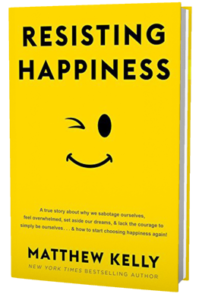 MATTHEW: I wanted to write a book that would speak deeply into the lives of two groups. First and foremost, the marginal or disengaged Catholic. I wanted to write a book that began with something we all struggle with and led to the realization that without God at the center of our lives, we don’t really stand a chance of having the happiness we all desire. Along the way, I wanted to teach them how to pray and give them the building blocks for a solid spiritual life.
MATTHEW: I wanted to write a book that would speak deeply into the lives of two groups. First and foremost, the marginal or disengaged Catholic. I wanted to write a book that began with something we all struggle with and led to the realization that without God at the center of our lives, we don’t really stand a chance of having the happiness we all desire. Along the way, I wanted to teach them how to pray and give them the building blocks for a solid spiritual life.
The second group I wanted to write for was committed Catholics. Many of us who are committed Catholics have gaps in our spiritual development. I wanted to share my early conversion journey with them so they could continue to build a solid inner life.
It is, of course, very difficult to write for both of these groups. But these are the people who come to Church at Christmas, and I wanted to write a book that was perfectly suited to our Christmas Book Program. I think I have succeeded, but we will only know when the emails and reviews begin to flow in.
BRANDON: How does this book tie in with the mission of Dynamic Catholic to “re-energize the Catholic Church in America by developing world-class resources that inspire people to rediscover the genius of Catholicism”?
MATTHEW: Books change our lives. I have seen it. The Book Program has proved it again and again. It is amazing how many people come back to church and get more involved in their parish because someone hands them a book at Christmas Mass. It’s really incredible. I was skeptical at first, but it just works.
To re-energize the Church we need to trigger people into engagement. The book program has become a proven and trusted way to do that. So writing this book with that specific purpose in mind ties perfectly into the Dynamic Catholic mission of meeting people where they are and leading them to where they are called to be, of engaging the disengaged, or triggering conversion, all in order to re-energize the Catholic Church in America.
BRANDON: How can someone use this book to begin a dialog with a friend or family member who has walked away from the Church?
MATTHEW: Very often, these are the people who only come to church once a year at Christmas, or not at all. Everything about the book was designed to appeal to these people. Give them a book with a holy picture on the cover and they simply won’t read it. Give them a book with “Trinity,” “Mary,” or “pope” in the title and they just won’t read it. So if you look at the cover of Resisting Happiness, it is light-hearted, playful, and non-threatening to these people. The text itself starts off with a very real human challenge, one that we all face, then leads to a solution that gently introduces God and his Church as the solution to that problem.
BRANDON: How does today’s culture distract us from happiness?
MATTHEW: In a thousand ways. We live in a culture of distraction. People today are afraid of missing out on stuff, so they find themselves rushing from one thing to another thing. In the process, they miss out on the stuff that God created just for them. We don’t need a lot of things or experiences; we only need the things, opportunities, and experiences that God has chosen for us. Less is more.
BRANDON: Why do people sabotage their own happiness?
MATTHEW: Sometimes because we are fragile and weak. Sometimes because we don’t really know what we want. Sometimes because we are afraid to totally surrender ourselves to God and his plans for our lives. And of course, there is that unspoken truth—we love some of our sins and we don’t want to give them up.
BRANDON: You often say big questions are answered with simple solutions. Can we find happiness with simple solutions?
MATTHEW: Yes. Absolutely. Both naturally and supernaturally. Daily exercise, regular sleep, and good and healthy food, all make you happier in a very natural way. On the other hand, the discipline of daily prayer exponentially increases our happiness on the spiritual plane. Wherever you find genius you find simplicity. Complexity is the way of the mediocre.
BRANDON: How can conquering resistance bring us closer to becoming the-best-version-of-ourselves?
MATTHEW: You cannot accomplish anything worthwhile without breaking through resistance. Naming it and understanding how it works helps you to do battle with it. And it is a battle. In order to become a-better-version-of-myself today, I must first slay resistance, then make choices that help me to become a better person than I was yesterday. You cannot become the-best- version-of-yourself, grow in virtue, or live a holy life without slaying resistance each day, and sometimes many times a day.
BRANDON: Rediscover Jesus was crafted in a way that is digestible to the reader, with action steps for everyday life. Is Resisting Happiness similar?
MATTHEW: Yes, but I resisted the temptation to use Rediscover Jesus as a template. This book ended up being thirty-seven short chapters, and I was OK with that. There was a temptation to stretch it out to forty chapters, but I didn’t. I think the quotes that are blown up in each chapter help with usability, and the action step and key point sections at the end of each chapter reinforce the message of the chapter and provide practical ways to implement what has just been read.
Writing a book that people will read and enjoy is one thing; writing a book that resonates with people is another thing. But writing a book that changes people’s lives is in a completely different realm. That is where I am always shooting for when I sit down to write a book. It is no small feat.
BRANDON: What do you hope people will take away from Resisting Happiness?
MATTHEW: I believe that simply naming resistance and learning to recognize it in our day is life- changing. I mean that with all sincerity. There is a lot more to the book, but as long as every reader takes away the ability to name and recognize resistance, I will feel that I have accomplished something incredible.
The post Resisting Happiness: An Interview with Matthew Kelly appeared first on Brandon Vogt.





July 27, 2016
Learning from a Courageous Opponent of the Nazis

Today we continue our regular series called “Learning from the Saints.” Our guide is expert Bert Ghezzi, a dear friend of mine and the author of numerous books including Voices of the Saints, Saints at Heart, and Discover Christ: Developing a Personal Relationship with Jesus.
His more recent books are The Power of Daily Mass and The Heart of Catholicism. You can learn more about Bert and his work at BertGhezzi.com.
Today, Bert profiles Bl. Titus Brandsma, the patron of journalists whose feast we celebrate today.
It seems almost axiomatic that the closer the saints draw to God in prayer the more likely they are to undertake bold public action in his name. Along with many like Teresa of Avila and Bridget of Sweden, Titus Brandsma illustrates the point.
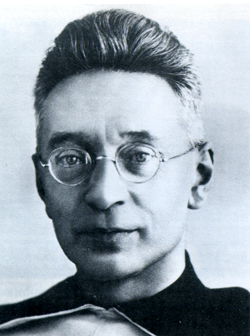 For nineteen years Carmelite Father Brandsma taught philosophy and mystical theology at the Catholic University of Nijmegen, which the Dutch bishops had founded in 1923. A widely respected scholar-activist, he organized Carmelite schools for boys, reformed the Carmelite seminary curriculum, and edited a journal on spirituality. He also established a library of medieval spiritual manuscripts, including 300 editions of the Imitation of Christ.
For nineteen years Carmelite Father Brandsma taught philosophy and mystical theology at the Catholic University of Nijmegen, which the Dutch bishops had founded in 1923. A widely respected scholar-activist, he organized Carmelite schools for boys, reformed the Carmelite seminary curriculum, and edited a journal on spirituality. He also established a library of medieval spiritual manuscripts, including 300 editions of the Imitation of Christ.
However, Father Brandsma made his most significant contribution at age 60 as a steely opponent of the Nazis. Johannes De Jong, Archbishop of Utrecht, commissioned him to unite the Catholic press against the Nazi invaders. He drafted a letter urging all editors to refuse to publish Nazi propaganda at whatever cost and personally delivered it to 14 of the most important Catholic papers. Then the German security forces arrested him and jailed him at Scheveningen. He appeared before one official who said he respected Titus’ firm convictions, but regarded him as a “very dangerous person.” Confined to a dark, windowless cell, Father Brandsma gathered spiritual strength in its solitude. He wrote:
“I am completely at home in this little cell. I haven’t been bored once. One the contrary, I am alone, yes, but never has the Lord been so near to me. I could shout for joy that he has allowed himself to be found by me, without me meeting people or people or people being allowed to meet me. He is now my sole refuge and I feel safe and happy. I am willing to remain here always, if he will allow me to. Rarely have I been so happy and content.”
Finally the Nazis sent Titus to Dachau where they forced him to work from 5:30 AM to 7:00 PM. He was sick with uremic poisoning and a severe foot infection, but his captors did not cut him any slack. Repeatedly, they punched, beat and gouged him, leaving him bloody and unconscious in the mud. But Titus frustrated his jailers with his forbearance. “Don’t yield to hatred,” he told other prisoners. “We are here in a dark tunnel but we have to go on. At the end, the eternal light is shining for us.”
Because of his disease, the Nazis ultimately put Titus in the camp hospital, where he endured degrading medical experiments. When they found him too weak for further tests, they killed him with a lethal injection on July 16, 1942.
Six months before, anticipating his martyrdom, Titus Brandsma wrote the following poem that inspired many people throughout Holland:
“Dear Lord, when looking up to Thee,
I see thy loving eyes on me;
Love overflows my humble heart,
Knowing what faithful friend Thou art
A cup of sorrow I foresee,
Which I accept for love of Thee.
Thy painful way I wish to go;
The only way to God I know.
My soul is full of peace and light;
Although in pain, this light shines bright.
For here Thou Keepest to They breast
My longing heart to find there rest.
Leave me here freely alone,
In cell where never sunlight shone,
Should no one ever speak to me,
This golden silence makes me free!
For though alone, I have no fear;
Never were Thou, O Lord, so near.
Sweet Jesus, please, abide with me;
My deepest peace I find in Thee.”
Read more from Bert at his website www.BertGhezzi.com, or check out his many books on Amazon.
The post Learning from a Courageous Opponent of the Nazis appeared first on Brandon Vogt.





July 14, 2016
[LAST CHANCE] Amazing $7 Video Course on “How to Defend the Bible” Ends Today!
A few days ago I told you about the “How to Defend the Bible” video course, and how you can get it for just $7…
Well, here’s the thing:
You need to get yours TODAY because the deal ends in a few hours!! Tomorrow the deal will be gone.
If you’re frustrated by what to say to skeptics when they criticize the Bible, then you need this:
Click here to get “How to Defend the Bible” course for only $7 (85% off!)
Hope you get in before it’s over!
P.S. If you want to become more confident and effective at defending your faith, this is a no-brainer. Honestly, I still can’t believe I convinced Dr. Scott Sullivan to drop the price to only $7! But there’s only a few hours left. Get access NOW before it’s gone forever!
The post [LAST CHANCE] Amazing $7 Video Course on “How to Defend the Bible” Ends Today! appeared first on Brandon Vogt.





July 13, 2016
[Video] Incredible Story: Friend of Fulton Sheen, Alcoholic, Priest of Mercy
A few months back, I wrote about the death of one of my closest friends, Fr. Ed Thompson. He passed away in February at 92 years old, the oldest active priest in the Diocese of Orlando.
He was a spiritual giant with a massive legacy. He served for over 20 years at our parish, St. Mary Magdalen in Altamonte Springs, FL, and was extremely close to our family: he married me and Kathleen, baptized our children, and served as my confessor ever since I became Catholic in 2008. He and I met weekly for instruction, prayer, and spiritual conversation. We spent hundreds of hours together over the past decade.
All who met Fr. Ed were struck by his deep faith and mercy. But few knew his whole story.
Shortly before he died, Fr. Ed allowed me to capture that remarkable story on video. He shared many things that he had only revealed to a few people during his life, including:
Why his mother was advised to abort him and his twin brother, David, but chose not to despite guaranteed suffering
Why he became a priest even though his parents and pastor discouraged him
His mother’s miraculous recovery from arthritis the day he went off to seminary
His experiences meeting Fulton Sheen and the time Sheen borrowed one of his jokes!
His harrowing battle with alcoholism, which got him kicked out of the priesthood
The inexplicable phone call from a person he hadn’t spoken to in 30 years that turned his life around
The one lesson he wanted to impart after 60+ years of being a Catholic priest
I know we live in a YouTube generation where 2-3 minute videos are the norm. But carve out twenty minutes today or tonight and listen to this magnificent story. It’s worth it. It will lift your heart. You’ll be inspired, filled with hope, and you’ll struggle to hold back tears (I know I did.)
Watch video → https://youtu.be/HG2tVVMid-Q
(If you’re reading this via email and don’t see the video, click here.)
PS. Thanks to the amazing Sean Beeson for composing such a great musical score for the video! What a gift you are.
The post [Video] Incredible Story: Friend of Fulton Sheen, Alcoholic, Priest of Mercy appeared first on Brandon Vogt.





July 12, 2016
The Ultimate Crash-Course On How To Defend The Bible
I’m sure you know that we live in a post-Christian culture that constantly attacks the beliefs of Christianity.
And often these attacks are directed at the Bible itself.
That’s why my friend Scott Sullivan created the How To Defend The Bible “Crash Course”.
It’s a simple, step-by-step method that teaches you how to answer to most common objections to the Bible in the shortest amount of time possible:
Click here → http://bvogt.us/defend-bible
Normally Scott sells this video course for $47, but I convinced him to cut the price down to just $7 for you (!!)
That’s NOT a typo. The entire course is just $7! That’s over 85% off!
No trials… no subscriptions… no shenanigans…
…I want you to have it because even if you don’t think you need it today, trust me… you will!
But here’s the catch:
This deal is only available until this Thursday at midnight ET, so NOW is the time to get access:
Get “How to Defend the Bible” Video Course for Only $7!!
Don’t tell yourself, “Cool! I’ll order it, but just not right now.”
We both know how easy it is to forget. If you don’t order it NOW, you’ll likely forget and miss out on this awesome deal.
So I hope you get in, and enjoy the course!
PS. Just to emphasize, this should be a NO-BRAINER. A master video course on How To Defend The Bible for just $7?? Don’t wait! Get it now!
The post The Ultimate Crash-Course On How To Defend The Bible appeared first on Brandon Vogt.





Brandon Vogt's Blog
- Brandon Vogt's profile
- 75 followers


